
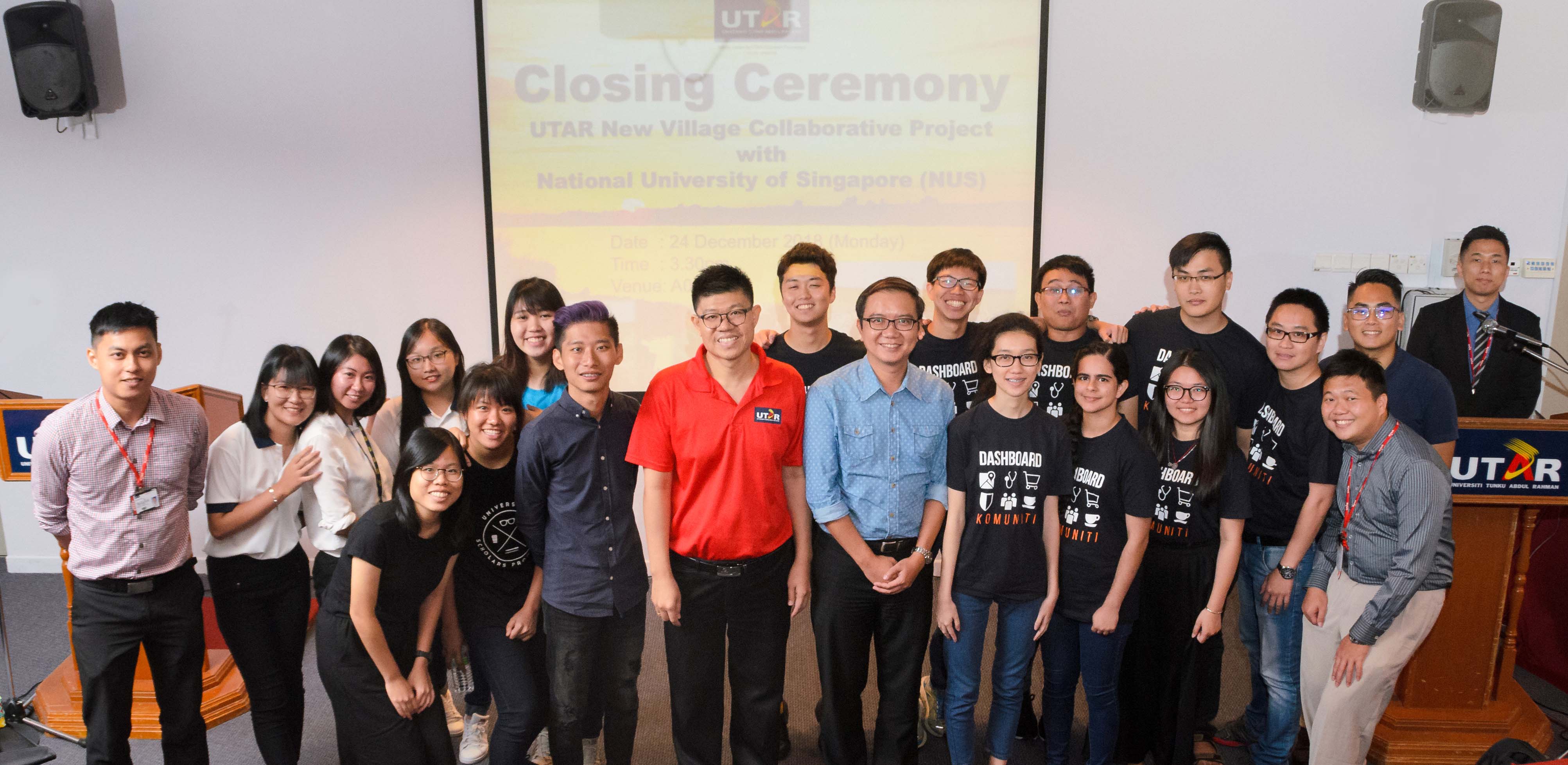
Prof Chong (centre) posing with participants and staff
Described as “Supercalifragilisticexpialidocious!” by one of the eight participants from National University of Singapore (NUS), the seventh UTAR New Village Collaborative Project with NUS successfully ended with a closing ceremony held on 24 December 2018, at Kampar Campus.
Present at the closing ceremony were Vice President for Student Development and Alumni Relations Prof Dr Choong Chee Keong, Department of Soft Skill and Competency (DSSC) Kampar staff, and participants of the project.
Co-organised by DSSC, the week-long project, held from 17 to 23 December 2018 was a civic engagement programme that encourages the practice of one’s soft skills, life skills and academic learning, which is aimed to help participants acquire new necessary skills, be a more involved global citizen in the society, learning more about the new villages, and helping to identify and address communal needs.
The New Village Collaborative Project is also an opportune platform for participants to develop international outlooks, enhance competencies of their soft skills and life skills, be prepared as a global citizen with tenacity to face challenges in a diversified cultural society, and establish network and friendship.
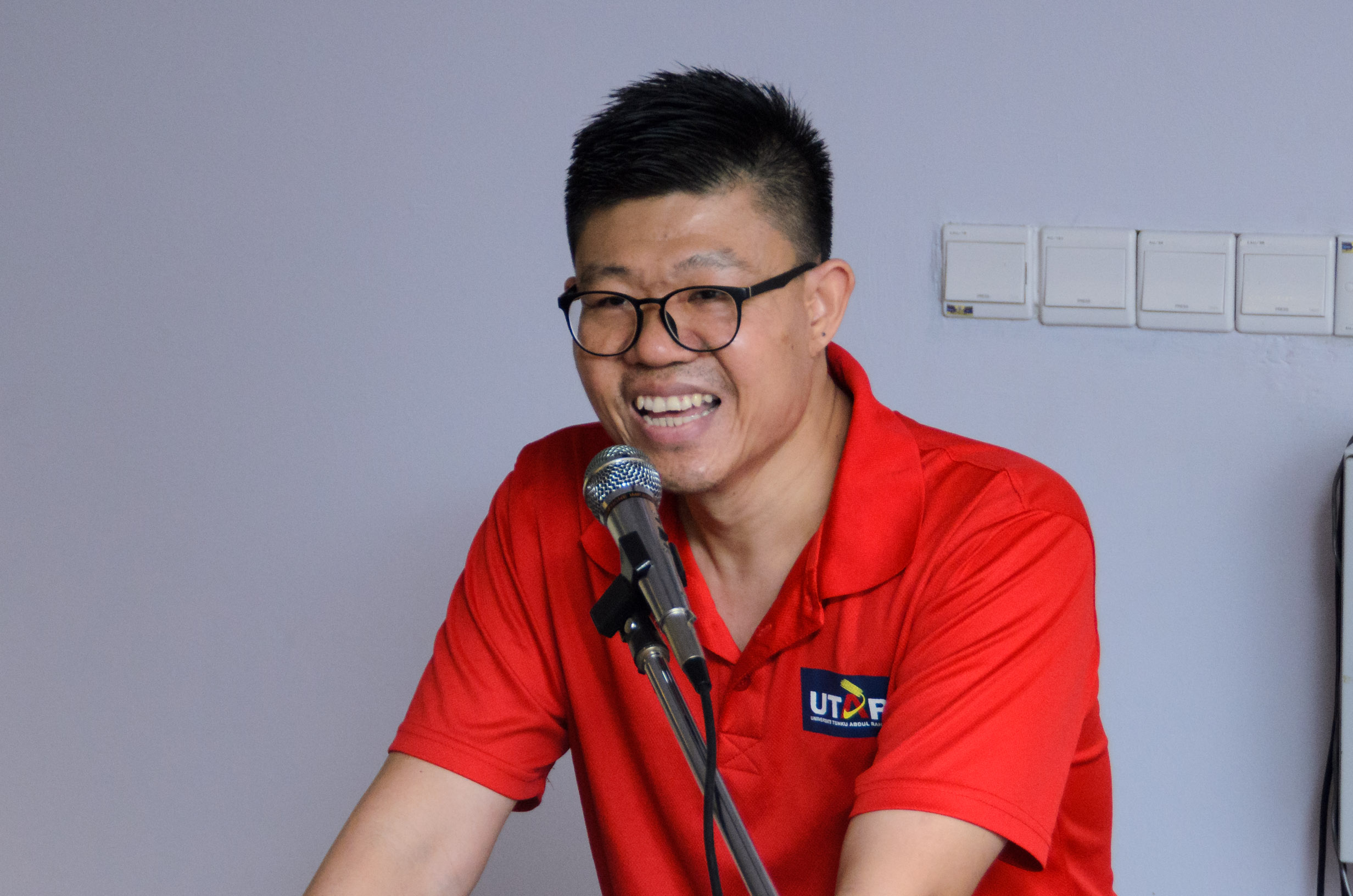
Prof Choong delivering his closing speech
“This is the seventh consecutive time that UTAR is conducting this meaningful project with NUS after our successful projects in recent years, including the previous one in a few fishing villages. It is very heartening that UTAR has the opportunity to host this project and collaborate with NUS again. I also thank NUS for the continuous support and commitment to mutually collaborate in a project that is able to provide participants a broader-based education through closer connections and real insights about the new village communities in Malaysia. The common goals of both institutions to achieve a more globalised and holistic education is one of the enabler for this project to stimulate participants’ interest, and develop an appreciation for diverse cultures. The collaborative project is also a platform for both participants of both institutions to share information and resources for learning, research, and community service. This form of experiential learning and interactive activities outside the classrooms will broaden participants’ outlooks of life,” said Prof Choong in his closing speech.
He added, “I believed this interactive learning and immersion in the new village settings have indeed broadened your outlook in thinking more rigorously about community work; understanding various communication styles; and gaining fresh perspectives on the historical roles and significance of new villages in the national development of Malaysia. I hope the villagers have enlightened you much with their sharing of experiences. It can be a humbling but very educational experience once you meet and talk to the villagers who have so much to tell. Remember their stories and share with your friends about all that you have learnt.”
Participants who visited Chui Chak Village were NUS students Marcus Ng Aik Wei, Lassarina Ho Qixuan, Ooi Wen Ting, Jenn Seah Wan Yu, and UTAR students Wong Hui Jun and Foong Pin Yi. Kuala Bikam Village was visited by NUS students Feng Yuan Wen, Kalvinder Kaur a/p Ranjit Singh, Myat Thu Kyaw and Goh Kher Liang, and UTAR students Lee Pei Yee and Wesley Ngoh Fook Cheng. Each group presented their findings and share their experience.

Respective group presenting their experience and learning outcomes
“I was interested with the historical background of new villages in Malaysia, which is something not Singaporeans will normally learn about, but it was a history and cultural emergent for me which was very interesting to me. One unusual experience for me was engaging with the Chinese community and walking around the Chinese cemetery to learn about the village’s traditions and celebrating Winter Solstice and visiting the temples in the village. From these trip, I understood the importance of language and I developed greater appreciation towards languages because language is an important element to help you understand other people,” commented Kalvinder.
“I have always been interested in community development. I was studying about community development and this trip was the perfect opportunity for me to practise what I have learnt. It was a good mix of theories and practice for me. Visiting the village taught me the warmth, friendliness among their community and even towards us. At the same time, I was also amazed with the community there embracing the use of technology and they do have an internet café there. Technology and the internet’s potential are limitless, therefore this internet café is one of the greatest assets to develop the village and its residents. I believe the people in the village also have great potential to expand their economic opportunities through diversified products; maybe through fruit plantation tours, fruits exports, and selling of fruit hampers. I certainly hope to be able to see the suggestions are successfully applied. I aspire to initiate more and to do more similar trips,” said Myat.
“My discipline is in Geography so it was very much related to me from the aspects of the development, interdisciplinary connections between farming and social development, and how spaces impact social groups. So the formation of new villages itself is very geographical in nature. The peripheral aspect of how these new villages were formed and how these impacted the lives of the villagers, and how did they develop from there really intrigued me. It was a spectacular study tour, firstly because we can no longer see such new villages in Singapore, and secondly the farm-to-table concept which is hard to get in Singapore as well. One of the memorable experiences for me is how the ex-village chief shot a wild boar and cooked it right there and then, and it was delicious. Part of the interesting village life is that the products are very organic, like the glutinous rice balls for Winter Solstice Festival were made from natural colours of plants and flowers,” enthused Ooi.
“The core of this project is about community development and this is something Prof Teo (NUS University Scholars Programme (USP) Deputy Director Assoc Prof Dr Albert Teo Chu Ying) emphasised strongly to us students. However it is important for us to be able to see it for ourselves - to experience and practise community development. It was certainly an exciting trip for me, because it would be impossible to have a new village experience like that in Singapore. For me personally, what struck me was when we were proposing the homestay programme to the villagers and they agreed, but the surprising part was that they welcome their guests to their home for free, unlike the AirB&B concept. It was very revolutionary for me. However, again, it comes back to the core of community development that is about having no preconceived notions and just maintaining that village spirit,” commented Ng.
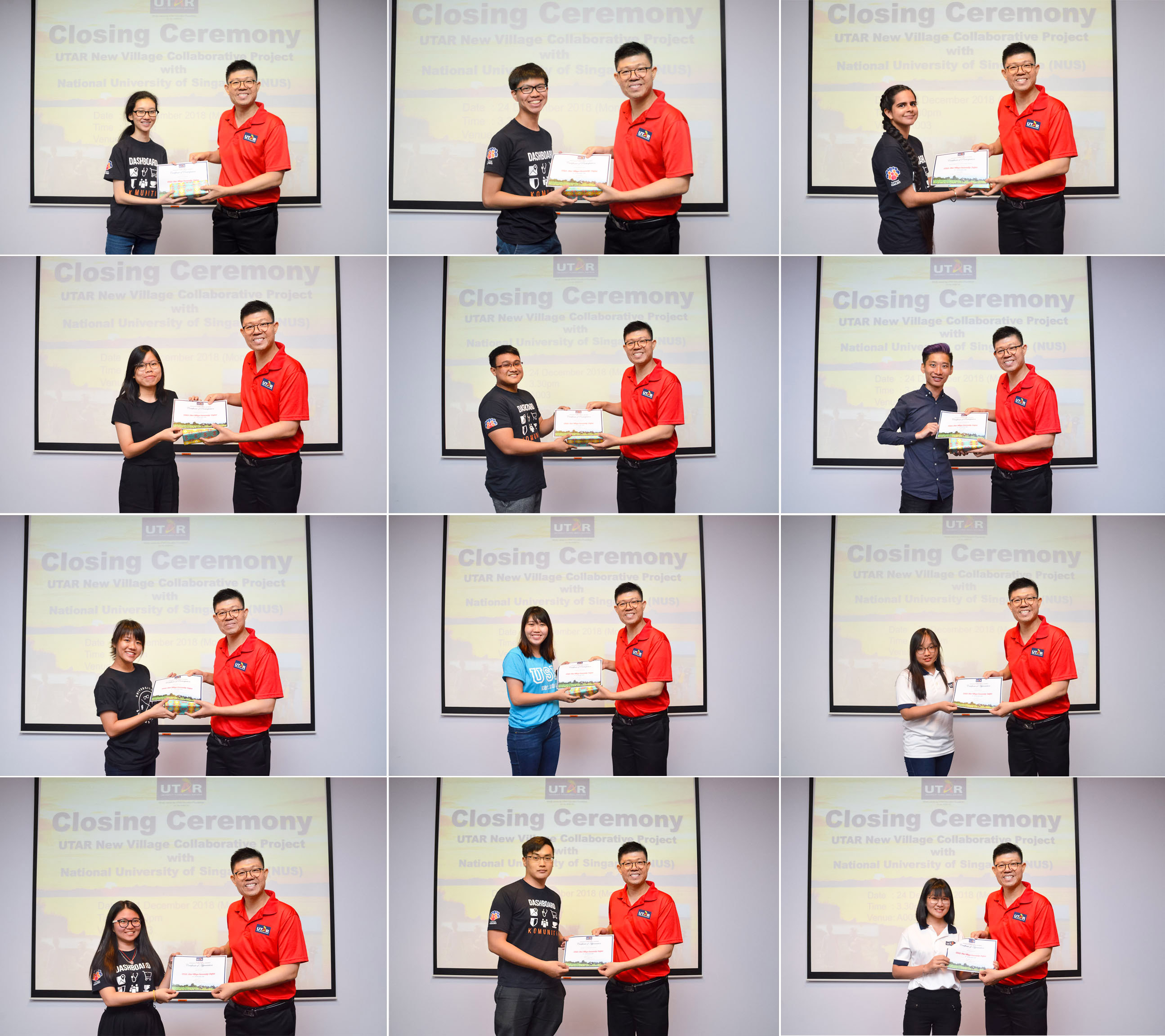
Prof Chong (right) presenting certificates to all participants
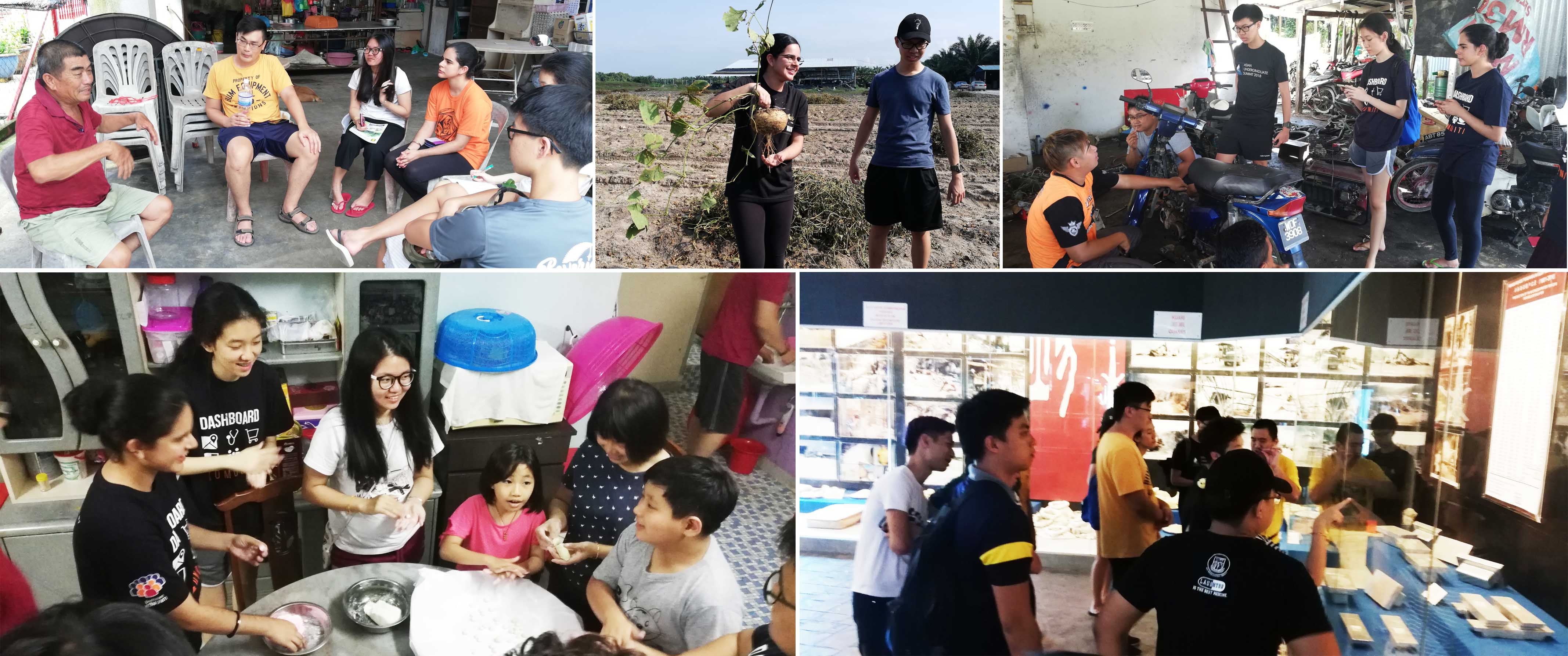
Participants visiting Kuala Bikam
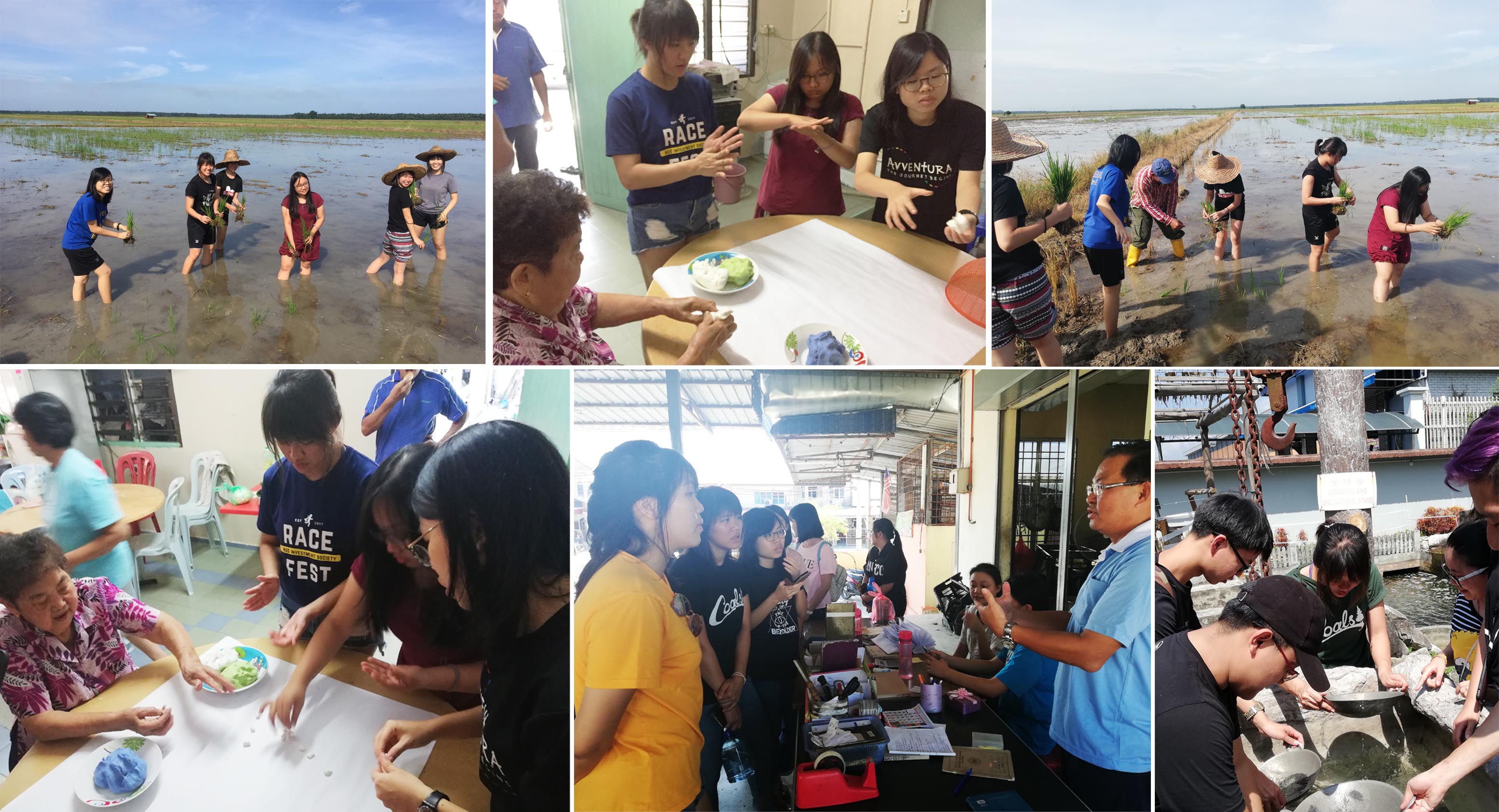
Participants visiting Chui Chak Village
UTAR New Village Collaborative Project collaborates with local foundations, companies, and foreign partnering universities to participate in the village community project. The activities involve social study, research, cultural exchange, sport-friendly matches and beautification projects for schools and homes. Collaboration with NUS was formed in 2012 and saw the first group of NUS USP students visited five new villages in Perak. The objective was to study the social and economic development in the new villages; collect information about the histories (narratives) and cultures of the new villages; and to identify and map the community assets of the new villages as well as to generate possible social entrepreneurship and community development ideas for the new villages.
Read more about past collaborative projects through the links below:
UTAR and NUS collaborate on community project
New Village Collaborative Project a hit again
New Village Collaborative Project with NUS
Fourth UTAR-NUS New Village Collaborative Project
© 2019 UNIVERSITI TUNKU ABDUL RAHMAN DU012(A).
Wholly owned by UTAR Education Foundation Co. No. 578227-M LEGAL STATEMENT TERM OF USAGE PRIVACY NOTICE